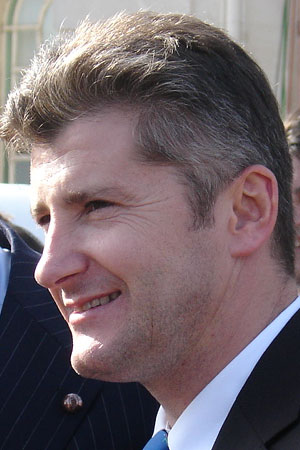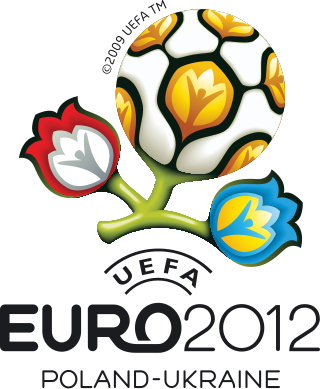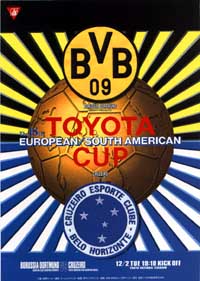
The Germany national football team represents Germany in men's international football and played its first match in 1908. The team is governed by the German Football Association, founded in 1900. Between 1949 and 1990, separate German national teams were recognised by FIFA due to Allied occupation and division: the DFB's team representing the Federal Republic of Germany, the Saarland team representing the Saar Protectorate (1950–1956) and the East Germany team representing the German Democratic Republic (1952–1990). The latter two were absorbed along with their records; the present team represents the reunified Federal Republic. The official name and code "Germany FR (FRG)" was shortened to "Germany (GER)" following reunification in 1990.

Raúl González Blanco, known mononymously as Raúl, is a Spanish football manager and former player who played as a forward. He is the current manager of Real Madrid Castilla, the reserve team of La Liga club Real Madrid. Regarded as one of the greatest forwards of all time, during a stage in his career he was simultaneously the all-time top scorer for Real Madrid, the Spain national team, and had the most goals in the UEFA Champions League. Raúl made over 1,000 appearances in his career.

The Spain national football team has represented Spain in men's international football competitions since 1920. It is governed by the Royal Spanish Football Federation, the governing body for football in Spain.

Davor Šuker is a Croatian football administrator and former professional player who played as a striker. He served as the president of the Croatian Football Federation from 2012 to 2021. As Croatia's all-time top scorer with 45 goals, Šuker is generally regarded as the greatest Croatian striker of all time, and as one of the greatest strikers of all time.

The 2008 UEFA European Football Championship, commonly referred to as UEFA Euro 2008 or simply Euro 2008, was the 13th UEFA European Championship, a quadrennial football tournament contested by the member nations of UEFA. It took place in Austria and Switzerland from 7 to 29 June 2008.

The Sweden women's national football team, nicknamed Blågult, represents Sweden at international women's association football competitions. It was established in 1973 and is governed by the Swedish Football Association.

Xavier Hernández Creus, commonly known as XaviHernández or simply Xavi, is a Spanish professional football manager and former player who most recently managed La Liga club Barcelona. Widely regarded as one of the greatest midfielders of all time, Xavi is renowned for his exceptional passing, vision, and positioning.

The 2012 UEFA European Football Championship, commonly referred to as UEFA Euro 2012 or simply Euro 2012, was the 14th European Championship for men's national football teams organised by UEFA. The final tournament, held between 8 June and 1 July 2012, was co-hosted by Poland and Ukraine, and was won by Spain, who beat Italy in the final at the Olympic Stadium, Kyiv, Ukraine.

The Adidas +Teamgeist is a football made by Adidas and developed jointly with Molten Corporation. It was the official match ball for the 2006 FIFA World Cup in Germany. The plus sign in its name was introduced for trademark purposes, since the regular German word Teamgeist, meaning "team spirit", could not be trademarked.

The 1997 Intercontinental Cup was an association football match played on 2 December 1997 between Borussia Dortmund, winners of the 1996–97 UEFA Champions League, and Cruzeiro, winners of the 1997 Copa Libertadores. The match was played at the neutral venue of the National Stadium in Tokyo in front of 46,953 fans. Andreas Möller was named as man of the match.

The 1996 Intercontinental Cup was an association football match played on 26 November 1996, between Juventus, winners of the 1995–96 UEFA Champions League, and River Plate, winners of the 1996 Copa Libertadores. The match was played at the National Stadium in Tokyo. It was Juventus' third appearance into the competition, after the defeat in 1973 and the victory in 1985 against Argentinos Juniors, whereas it was River Plate's second appearance after the victory in 1986 against Steaua București.

The 1995 Intercontinental Cup was an association football match played on 28 November 1995 between Ajax, winners of the 1994–95 UEFA Champions League, and Grêmio, winners of the 1995 Copa Libertadores. The match was played at the National Stadium in Tokyo. It was Ajax's second appearance into the competition, after the victory in 1972; moreover, Ajax declined to play in 1971 and 1973, being replaced by Panathinaikos and Juventus respectively. It was Grêmio's second appearance as well, after the victory in 1983.

The 1994 Intercontinental Cup was an association football match played on 1 December 1994, between Milan, winners of the 1993–94 UEFA Champions League, and Vélez Sársfield, winners of the 1994 Copa Libertadores. The match was played at the National Stadium in Tokyo. It was Milan's sixth appearance into the competition, after the victories in 1969, 1989, 1990 and the defeats in 1963 and 1993, whereas it was Vélez Sársfield's first appearance.

The UEFA Euro 2012 final was the final match of Euro 2012, the fourteenth edition of the European Championship, UEFA's competition for national football teams. The match was played at the Olympic Stadium in Kyiv, Ukraine, on 1 July 2012, and was contested between defending champions Spain and Italy.

Hristo Stoichkov Stoichkov is a Bulgarian former professional footballer and current football commentator for TUDN. A prolific forward, he is widely regarded as the greatest Bulgarian footballer of all time. He was the runner-up for the FIFA World Player of the Year award in 1992 and 1994 and received the Ballon d'Or in 1994. In 2004, Stoichkov was named by Pelé in the FIFA 100 list of the world's greatest living players.

Carlos Eduardo Fierro Guerrero is a Mexican professional footballer who plays as a winger for UdeG.

The Adidas Tango 12 was the official match ball of the UEFA Euro 2012, with variants being used for the 2012 Summer Olympics. The ball is named after the original and successful Adidas Tango family of footballs from the late 1970s, but the construction of the Tango 12 is completely different. Variations of the ball have been used in other contemporary competitions including the Africa Cup of Nations and the Summer Olympics – Adidas has not categorised these football as the "Adidas Tango 12" family, however they are listed here due to their similar design.
The Adidas Conext is a family and brand of association football balls. The Conext balls have had different numbers in their names applied to them to distinguish them in their construction. The balls had been produced for various competitions including the FIFA Women's World Cup, the football competition of the Summer Olympic Games, the UEFA Super Cup, the FIFA Club World Cup, and various club national competitions.
The Adidas Nativo is a family and brand of association football balls. Used as official match balls of Major League Soccer and MLS All-Star Game, the Nativo balls have had different numbers in their names applied to them to distinguish them in their construction.
















